
Showcasing the latest research, practice and innovation across the emergency management sector, the AFAC23 powered by INTERSCHUTZ event was multi-streamed across four concurrent conferences – AFAC Conference, the Australian Disaster Resilience Conference, the Institution of Fire Engineers Australia National Conference, and the Women and Firefighting Australasia Conference – as well as an extensive trade and poster exhibition and a professional development program, all under one roof.
This major event took place in Meanjin/Brisbane on the lands of the Yuggera and Turrbal peoples, with Natural Hazards Research Australia supporting as the official Industry Research Partner.
Across four days from 22–25 August, more than 3,200 delegates from 44 different countries and hundreds of different emergency management, industry, government, research, community and not-for-profit organisations congregated at Brisbane Convention and Exhibition Centre to discuss natural hazard impacts, centred around the theme ‘Creating a sustainable future: the challenges and opportunities’.
The Centre’s Board and staff contributed to the program through presentations of key research, chairing multiple sessions and providing project overviews. At the Centre’s eye-catching exhibitor booth, staff participated in many collaborative discussions about future research-backed solutions to natural hazard issues, including a visit from federal Minister for Agriculture, Drought and Emergency Management the Hon Senator Murray Watt, and ACT Minister for Police and Emergency Services Mick Gentleman.
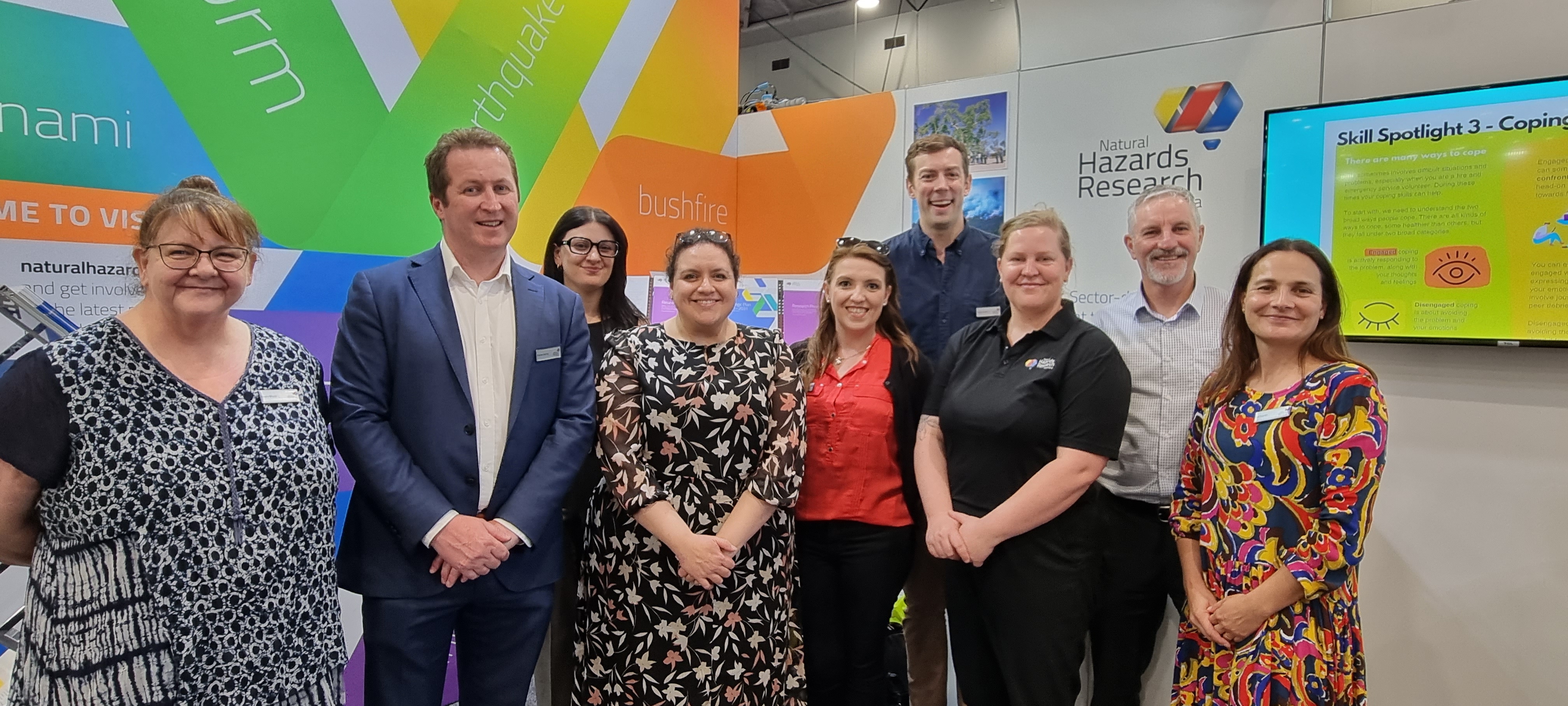
Natural Hazards Research Australia staff at the AFAC23 booth in August.
Natural Hazards Research Australia staff and Board members meeting the Hon Senator Murray Watt at the AFAC23 booth.
AFAC23 opened with the Research and Innovation Day – the Centre’s most significant contribution to the program, reflecting our strong connections between research and industry across Australia.
CEO Andrew Gissing gave the opening address, inviting everyone to consider the essential contributions that research makes to their roles.
“If you are a changemaker, you’re in the right room,” he said. "Research and innovation have never been more important in supporting us to confront our challenges.”
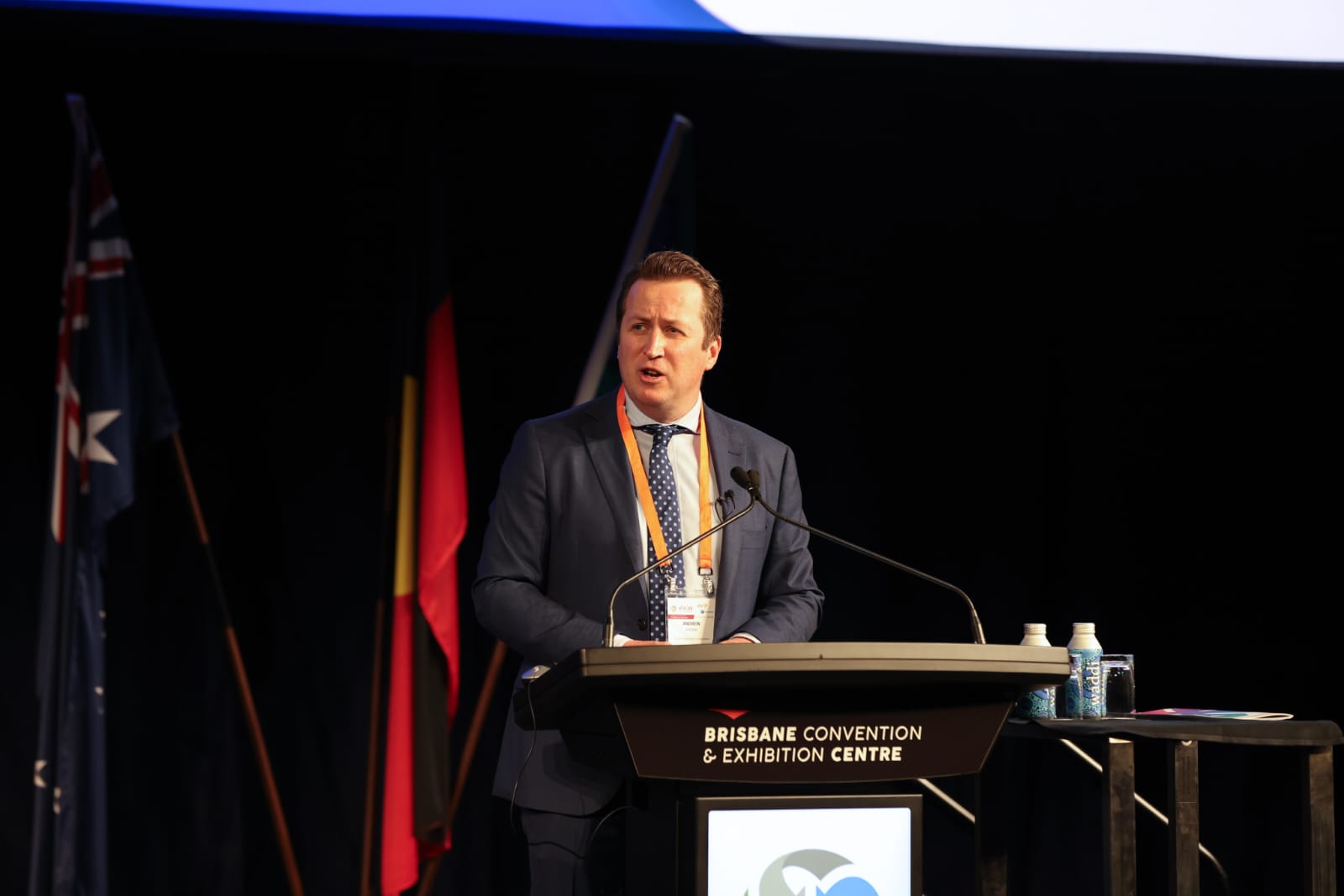
CEO Andrew Gissing giving the opening address at AFAC23's Research and Innovation Day. Photo courtesy of AFAC.
One of the opening keynotes for the Research and Innovation Day was presented by Oliver Costello, the Centre’s Board member and Director of the Jagun Alliance.
"Fire is the principal way we’ve cared for Country. It teaches us its lore, behaviour, benefits and challenges.” Oliver said. "Country is teaching us but are we learning? We need regenerative pathways to heal Country otherwise we will keep having these conversations over and over again.”
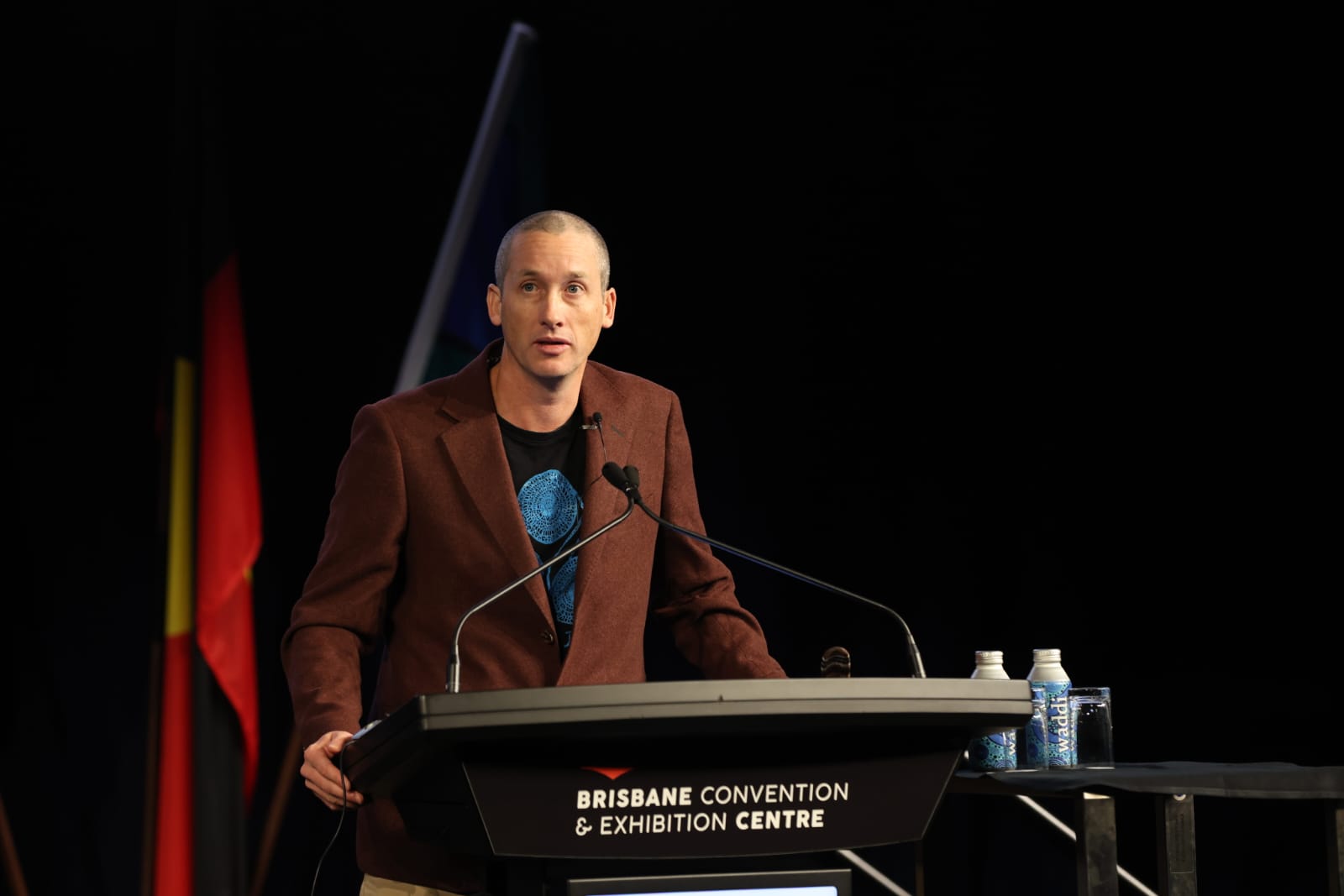
Oliver Costello giving a keynote at AFAC23's Research and Innovation Day. Photo courtesy of AFAC.
The Research and Innovation Day program comprised four streams, covering cultural land management, information and warnings, bushfire management and out-of-the-box technology, including presentations from several Centre-connected experts:
- A/Prof Jessica Weir (Western Sydney University) on the similarities and opportunities between cultural burns, ecological burns and hazard reduction burns.
- Dr Paula Dootson (Queensland University of Technology) on recent Centre research into predictive maps for communities during bushfire
- A/Prof Marta Yebra (Australian National University) and Prof Simon Jones (RMIT University) on a panel about technological advances to improve fire detection.
Throughout the week, delegates saw 165 presentations and networked at 196 exhibitor booths. Research posters were on display, showcasing excellent research from across the sector. Across multiple streams, presentation topics included global emergency challenges, disaster resilience, First Nations’ lessons, communications and organisational culture, future preparation and workforces, creative community recovery, flood and fire intelligence, multi-organisational collaboration, technological and data innovations, insurance action, nature-based solutions, workplace health and safety, disability inclusivity, and gender and diversity in emergency management.
A Centre highlight was the launch of the new national State Emergency Service (SES) Fitness for Role program, based on ten years of research through the Bushfire and Natural Hazards CRC, which is now being rolled out in SES units across the country. The new SES program was presented to delegates by Dr John Bates and Terese Howlett (Victoria SES) and formally launched with a media conference at the Natural Hazards Research Australia exhibitor booth on Day 3. Find out more about this launch here.
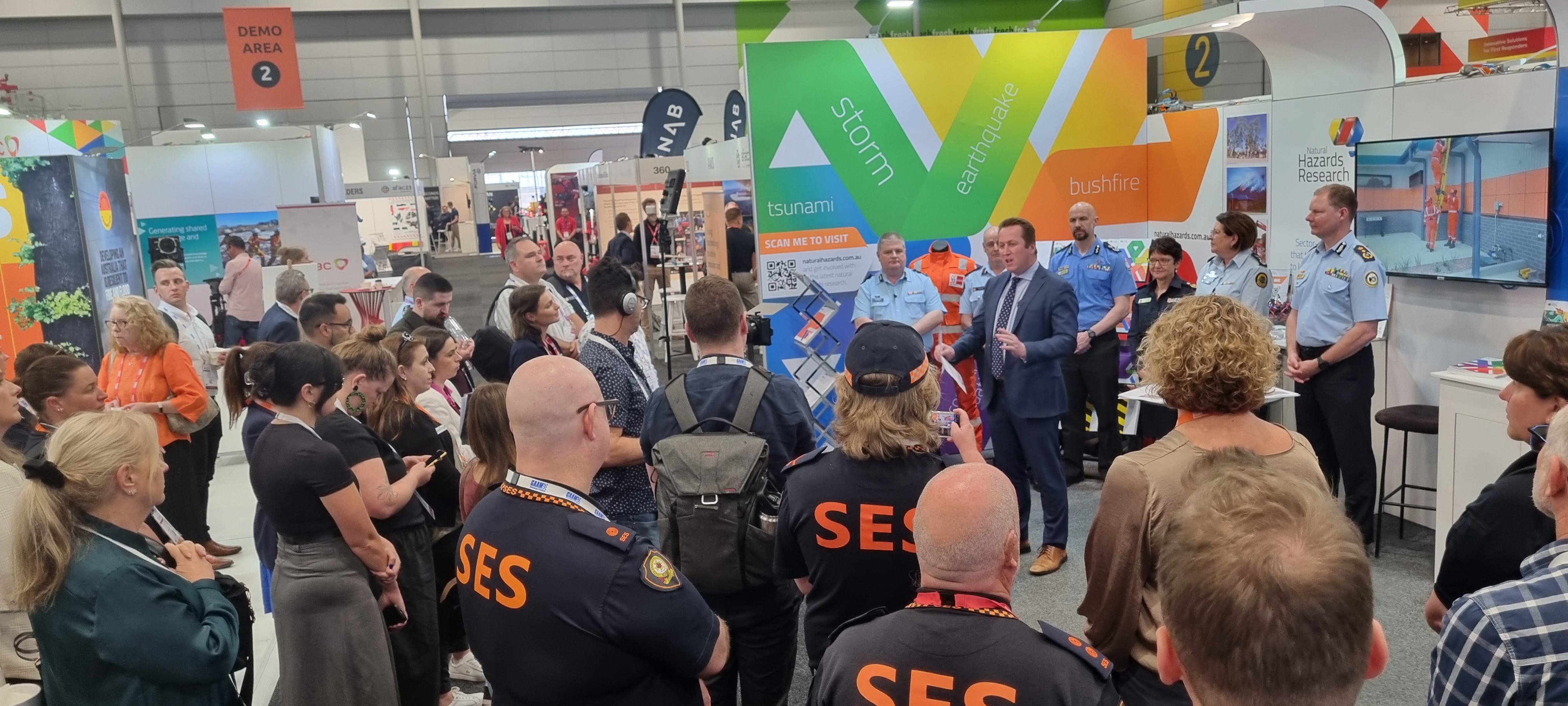
CEO Andrew Gissing speaking at the formal launch of the SES Fitness for Role program at Natural Hazards Research Australia's booth at AFAC23.
Also launched with a media conference at AFAC23 was the Seasonal Bushfire Outlook for Spring 2023 – a collaborative product formerly developed by the Bushfire and Natural Hazards CRC that outlines the fire potential across the country.
Several Centre staff gave presentations across the four days, including:
- CEO Andrew Gissing on ‘Be Ahead of Ready’ workshops that are helping the sector identify big ideas and drivers of the future
- CEO Andrew Gissing as part of the EMSINA professional development workshop
- Partnership Development Director Sarah Mizzi and Node Research Managers Nicola Moore, Dr Kat Haynes and George Goddard on identifying and prioritising your research needs
- Dr Kat Haynes and A/Prof Mel Taylor (Macquarie University) on post-flood research being used to identify policy-related insights
- Nicola Moore on the Disaster Challenge for postgraduates and early career researchers.
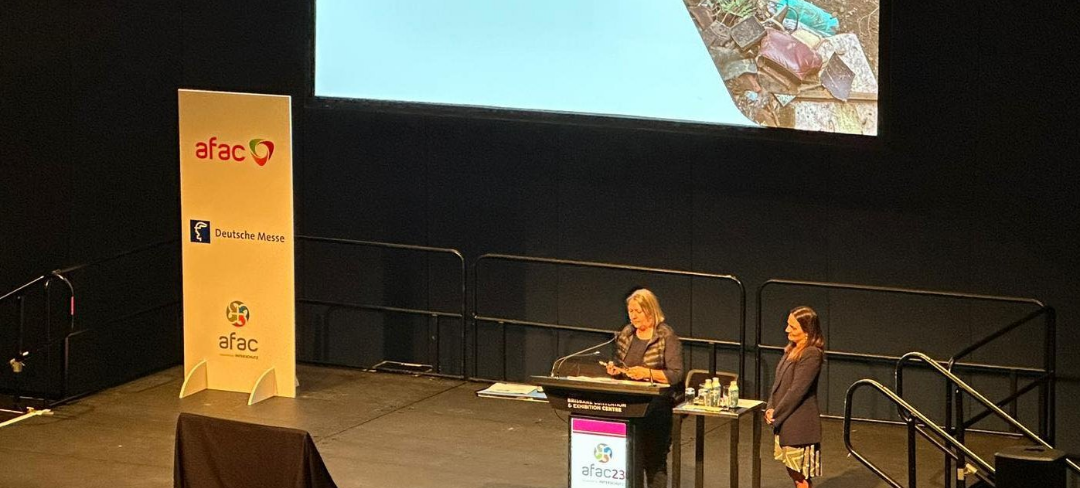
A/Prof Mel Taylor (Macquarie University) and Dr Kat Haynes presenting post-flood research at AFAC23.
Other experts connected to the Centre also presented, including:
- Bhiamie Eckford-Williamson (Monash University) on creating safe opportunities for Indigenous peoples in emergency management on Day 2 and ongoing work on Indigenous healing on Day 3
- A/Prof Mel Taylor (Macquarie University) on self-organising community groups
- Liza Gelt (Collaborative Consulting) and Craig Arthur (Geoscience Australia) on severe weather impact prediction research
- John Gilbert (Country Fire Authority Victoria) and Dr Ken Strahan (Strahan Research) on lessons from a Bushfire and Natural Hazards CRC study of individual and household bushfire preparedness and decision making in Victoria
- Neil Munro (Country Fire Authority Victoria) on building disaster resilience into the school curriculum.
